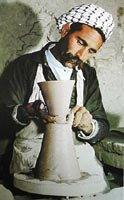Handicraft:
 Passing down from generation to generation, handicrafts are a living
heritage in so far as they are renewed at each generation.
Passing down from generation to generation, handicrafts are a living
heritage in so far as they are renewed at each generation.
Iraqi villagers who net mats, and make chairs, beds and other colorful
pieces of furniture made out of reeds or palm trees leaves are in fact
participating in trade and getting a source of income and can contribute to
economic development. Thus crafting lies at the heart of a cultural heritage
that already exists yet is still in the making: it testifies to the
diversity of cultures in the present while becoming a vector of cultural
pluralism for the future.
By creating things that are both beautiful and useful, handicrafts help
human beings to change and enhance their environment.
In this way every utilitarian gesture acquires a deep meaning and takes root
in the aesthetic and ethical values of peoples and individuals. Even the
most common objects convey meaning and reflect, beyond their everyday use, a
unique interpretation of life. This ability to give meaning and beauty to
the most mundane activities of everyday life -- one of the distinguishing
marks and fundamental values of humankind -- should be carefully protected
and safeguarded.
 Faced with the threat of industrial standardization, handicrafts need to be
safeguarded through a fertile dialogue with modernity. This calls for dual
training of crafts persons in market trends and networking for distribution
and promotion of creativity and innovation. Hence the importance of
encouraging the participation of creative crafts persons in professional
shows at regional and international levels.
Faced with the threat of industrial standardization, handicrafts need to be
safeguarded through a fertile dialogue with modernity. This calls for dual
training of crafts persons in market trends and networking for distribution
and promotion of creativity and innovation. Hence the importance of
encouraging the participation of creative crafts persons in professional
shows at regional and international levels.

